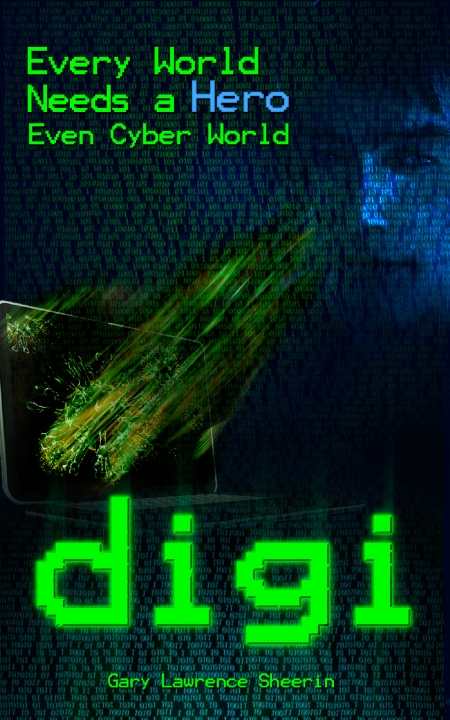Digi
Father-son relationships drive both the young protagonist and antagonist on their journey through the digital world.
A solid juvenile science-fiction adventure, digi follows computer-illiterate Peter as he acquires the power to physically enter cyberspace. Vivid, fun, and charming, this light romp is reminiscent of cyberpunk but lacks that genre’s notorious exclusivity. Middle-schoolers and young high-schoolers will enjoy it, even if their background in technology is minimal.
Before acquiring his powers, Peter’s limited grasp of computers is the least of his problems. His father, a down-on-his-luck fall guy for a negligent accounting firm, can barely afford to feed their family, let alone buy Peter a new computer. But when lightning strikes, Peter acquires the ability to see and communicate with electronic information, not to mention physically travel through cyberspace. Meanwhile, a school bully named Terry releases a virus that threatens to destroy the Internet. Peter must stand up to his enemy to save not only his reputation but the world.
Father-son relationships are central to digi, and in many ways the book is best understood in this context. Peter’s sweet but helplessly poor father contrasts well with Terry’s wealthy but cold one. Both the protagonist and the antagonist are motivated by the same basic impulse to please their dads, which should make both sympathetic to many young male readers.
Peter’s bravery in the face of his own ignorance is also something that tween readers may appreciate. Though most of his success is predicated by luck, including the lightning strike, Peter makes the most of every opportunity and follows the hero’s path unerringly. He is a thoroughly likable and sympathetic character whose strong moral compass only occasionally seems too staid to be real. Terry, on the other hand, revels so deeply in his badness that without his motivating desire for his father’s attention, he would be nearly implausible. Nevertheless, specimens of his type will be all too familiar to the target audience, and while it is possible to sympathize with him somewhat, his downfall will evoke nothing but cheers.
Despite the polarization of the protagonist and antagonist, all characters are strongly built and plausible. In the context of their age group, they struggle with drifting friends, first crushes, and the adult-level sacrifices family members make for one another during hard times. The setting’s complex backdrop allows each character to blossom and interact realistically and with ease.
The tightness of Gary Lawrence Sheerin’s writing style helps to make digi an enjoyable, quick read. Young readers will have no trouble following the clear language and straightforward plot.
digi’s status as a debut novel is a surprise. The sophistication of the writing implies both experience and talent, and the vivid characters seem both familiar and fresh. This book is easily recommendable to any young science-fiction fan.
Reviewed by
Anna Call
Disclosure: This article is not an endorsement, but a review. The publisher of this book provided free copies of the book and paid a small fee to have their book reviewed by a professional reviewer. Foreword Reviews and Clarion Reviews make no guarantee that the publisher will receive a positive review. Foreword Magazine, Inc. is disclosing this in accordance with the Federal Trade Commission’s 16 CFR, Part 255.

